What Does a Masonry Drill Bit Look Like?

When it comes to drilling into masonry surfaces such as concrete, brick, or stone, using the right drill bit is crucial. A masonry drill bit is specially designed to handle the tough and dense nature of these materials, making drilling through them a breeze. But what exactly does a masonry drill bit look like?
A masonry drill bit typically has a distinctive look that sets it apart from other types of drill bits. It is made from a harder material, such as tungsten carbide, that can withstand the pressure and heat generated during drilling. The tip of a masonry drill bit is pointed, allowing it to penetrate the tough surface of masonry materials easily.
In addition to its pointed tip, a masonry drill bit also has spiral flutes along its body. These flutes serve two important purposes. First, they help to remove the debris and dust that accumulate during drilling, preventing them from clogging the bit and hindering the drilling process. Second, the flutes act as channels for the cooling agent, such as water or lubricant, helping to dissipate the heat generated during drilling and prolonging the life of the drill bit.
Furthermore, masonry drill bits are available in various sizes and lengths to accommodate different drilling needs. They can range from small bits for drilling small holes to large ones for drilling larger holes or for heavy-duty drilling applications. It is important to select the right size and length of the drill bit for the job to ensure optimal performance and efficiency.
In conclusion, a masonry drill bit is an essential tool for drilling into masonry surfaces. Its distinctive design, including a pointed tip and spiral flutes, allows for easy penetration and efficient drilling. By choosing the right size and length of the drill bit, you can ensure successful drilling and achieve the desired results on your masonry projects.
Key Features of a Masonry Drill Bit
Masonry drill bits are specially designed to drill into materials like brick, concrete, and stone. They have several key features that distinguish them from regular drill bits:
1. Carbide Tip
Masonry drill bits typically have a carbide tip, which is a hard and durable material that can withstand the intense pressure and friction of drilling into tough materials. The carbide tip helps to maintain the sharpness of the drill bit and prevents it from dulling quickly.
2. Flute Design
The flute design of a masonry drill bit is another important feature. The flutes are the grooves along the length of the drill bit that help to remove the debris and dust from the hole as you drill. The flute design also helps to reduce heat buildup and prevent the drill bit from getting stuck in the material.
3. Shank Shape
The shank of a masonry drill bit is often hexagonal in shape, which provides a secure grip in a drill chuck and helps prevent the bit from slipping or spinning while drilling. The hexagonal shape also allows for greater torque transfer, increasing the drilling efficiency.
4. Size and Diameter
Masonry drill bits come in various sizes and diameters to accommodate different drilling needs. The size and diameter of the drill bit you choose will depend on the specific project and the size of the hole you need to drill.
5. Compatibility with Hammer Drills
Masonry drill bits are designed to be used with hammer drills, which provide a hammering action that helps to break up the tough materials and assist in drilling. These drill bits are not compatible with regular rotary drills due to the increased force required to penetrate masonry materials.
6. Durability
Due to the nature of the materials they are designed to drill into, masonry drill bits are built to be extremely durable. They are made to withstand the high levels of stress and heat generated during drilling, ensuring that they can handle multiple uses without breaking or dulling quickly.
7. Application
Masonry drill bits are commonly used in construction projects, such as installing anchors, drilling holes for wall plugs, or creating openings for pipes and wires. They are also useful for DIY projects that involve working with materials like bricks or concrete.
Overall, the key features of a masonry drill bit, including the carbide tip, flute design, shank shape, size and diameter options, compatibility with hammer drills, durability, and application versatility, make it an essential tool for drilling into tough masonry materials.
Different Types of Masonry Drill Bits
Masonry drill bits are specially designed for drilling into hard materials like concrete, brick, and stone. They have a unique shape and construction that allows them to cut through these tough materials efficiently. Here are some of the different types of masonry drill bits:
- Twist Drill Bits: These are the most common type of masonry drill bits. They have a twisted flute design that helps to propel the debris out of the hole as you drill. They are available in various diameters and lengths and are suitable for drilling smaller holes in masonry.
- Masonry Percussion Bits: These drill bits have a carbide tip that is specially designed to withstand the high impact of a hammer drill. They are used with a hammer drill or rotary hammer to drill larger holes in masonry. The percussive action of the drill helps to break up the material as the bit rotates.
- Masonry Core Bits: These drill bits are used for drilling larger diameter holes in masonry. They have a hollow center that allows for the removal of the core of material as you drill. They are commonly used for creating holes for pipes, cables, and conduits.
- Tile and Glass Bits: These specialized masonry drill bits are designed for drilling into tiles, glass, and ceramics. They have a tungsten carbide tip that is specifically formulated to handle the hardness of these materials without chipping or cracking them.
- Multi-Purpose Drill Bits: These drill bits are versatile and can be used for drilling through a variety of materials including masonry. They have a carbide tip that is suitable for cutting through hard materials, but they can also be used for drilling into wood, metal, and plastic.
Choosing the Right Masonry Drill Bit
When choosing a masonry drill bit, it’s important to consider the type of material you will be drilling into, as well as the size of the hole you need to create. Different types of drill bits are designed to handle different materials and sizes, so make sure to select the appropriate one for your specific application.
Additionally, consider the speed and power of your drill. Some masonry drill bits require a hammer drill or rotary hammer for effective use, while others can be used with a regular drill. Make sure to check the manufacturer’s recommendations for the drill bit to ensure compatibility and safe operation.
By choosing the right masonry drill bit for your project, you can ensure clean and precise holes in hard materials, making your drilling tasks easier and more efficient.
Materials Used for Masonry Drill Bits
Masonry drill bits are specifically designed to effectively drill holes in masonry materials such as concrete, brick, and stone. These types of drill bits are made from various materials that offer different characteristics and benefits for specific drilling applications.
Here are some common materials used for masonry drill bits:
1. High-Carbon Steel
High-carbon steel is a common material used for masonry drill bits due to its durability and affordability. It is suitable for drilling through soft masonry materials such as bricks and lightweight concrete. However, high-carbon steel drill bits may lose their sharpness quickly when used on harder materials like reinforced concrete.
2. Carbide Tipped
Carbide tipped drill bits are made with a high-strength carbide tip that is brazed onto the steel body of the bit. These drill bits are extremely durable and can handle drilling through hard and abrasive materials like concrete, stone, and granite. Carbide tipped drill bits offer superior performance and extended tool life compared to high-carbon steel drill bits.
3. Diamond-Coated
Diamond-coated drill bits are one of the most durable and efficient options for drilling through very hard materials like reinforced concrete, porcelain, and ceramic tiles. These drill bits are made with a thin layer of diamond grit bonded to the bit’s surface. Diamond-coated drill bits provide excellent cutting performance and can withstand high drilling speeds and temperatures.
4. Cobalt Steel
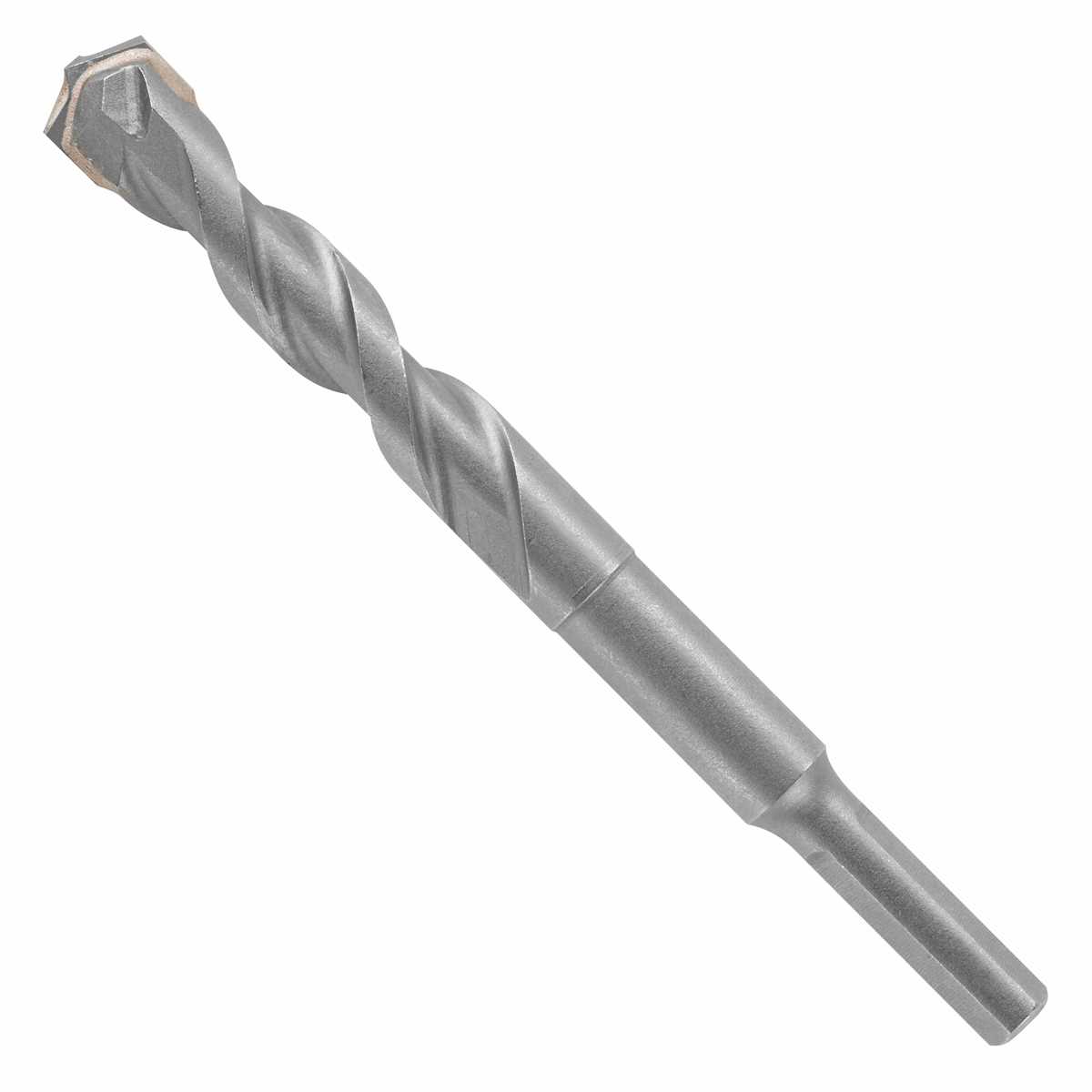
Cobalt steel drill bits are designed to handle drilling through hard metals like stainless steel, cast iron, and hardened steel. While not specifically made for masonry drilling, cobalt steel drill bits can also be used for light masonry work. These drill bits have high heat resistance and are less prone to breakage compared to standard high-speed steel drill bits.
5. Tungsten Carbide
Tungsten carbide drill bits are known for their hardness and ability to withstand high temperatures. These drill bits are suitable for drilling through masonry materials like concrete, bricks, and stones. Tungsten carbide drill bits offer excellent durability and cutting performance.
| Material | Advantages | Disadvantages |
|---|---|---|
| High-Carbon Steel | Affordable, suitable for soft masonry materials | Can lose sharpness quickly, not suitable for hard materials |
| Carbide Tipped | Durable, suitable for hard and abrasive materials | Relatively expensive compared to high-carbon steel |
| Diamond-Coated | Very durable, excellent cutting performance | Expensive, may require water cooling for prolonged use |
| Cobalt Steel | Heat resistant, suitable for hard metals | Not specifically designed for masonry drilling |
| Tungsten Carbide | Hardness, high-temperature resistance | Relatively expensive |
When choosing a masonry drill bit, it is important to consider the specific material you will be drilling and select a drill bit that is appropriate for that material. Using the correct drill bit will ensure efficient drilling and prolong the life of the bit.
How to Choose the Right Masonry Drill Bit for Your Project
Choosing the right masonry drill bit is essential for the success of your project. Whether you’re drilling into bricks, concrete, or other masonry materials, using the correct drill bit can make the process easier and more efficient. Here are some factors to consider when selecting a masonry drill bit:
1. Material
The material of the masonry drill bit is a crucial factor. Most masonry drill bits are made of carbide, which is a hard and durable material. However, there are also masonry drill bits made of high-speed steel (HSS) or cobalt. Carbide drill bits are ideal for drilling into hard masonry materials, while HSS or cobalt drill bits are better suited for softer materials.
2. Size
The size of the drill bit is another important consideration. The size is usually indicated by the diameter of the bit, measured in inches or millimeters. Make sure to choose a drill bit that matches the size of the hole you need to create. It’s always better to select a slightly larger size if you’re unsure, as you can always fill the hole if needed.
3. Type
There are different types of masonry drill bits, each designed for specific applications. The most common types include:
- Percussion Masonry Drill Bits: These drill bits are versatile and suitable for most masonry drilling tasks.
- SDS Drill Bits: These bits have a specialized shank system and are commonly used in rotary hammer drills.
- Tile Drill Bits: These bits have a carbide or diamond tip and are specifically designed for drilling into ceramic tiles and glass.
4. Shank Type
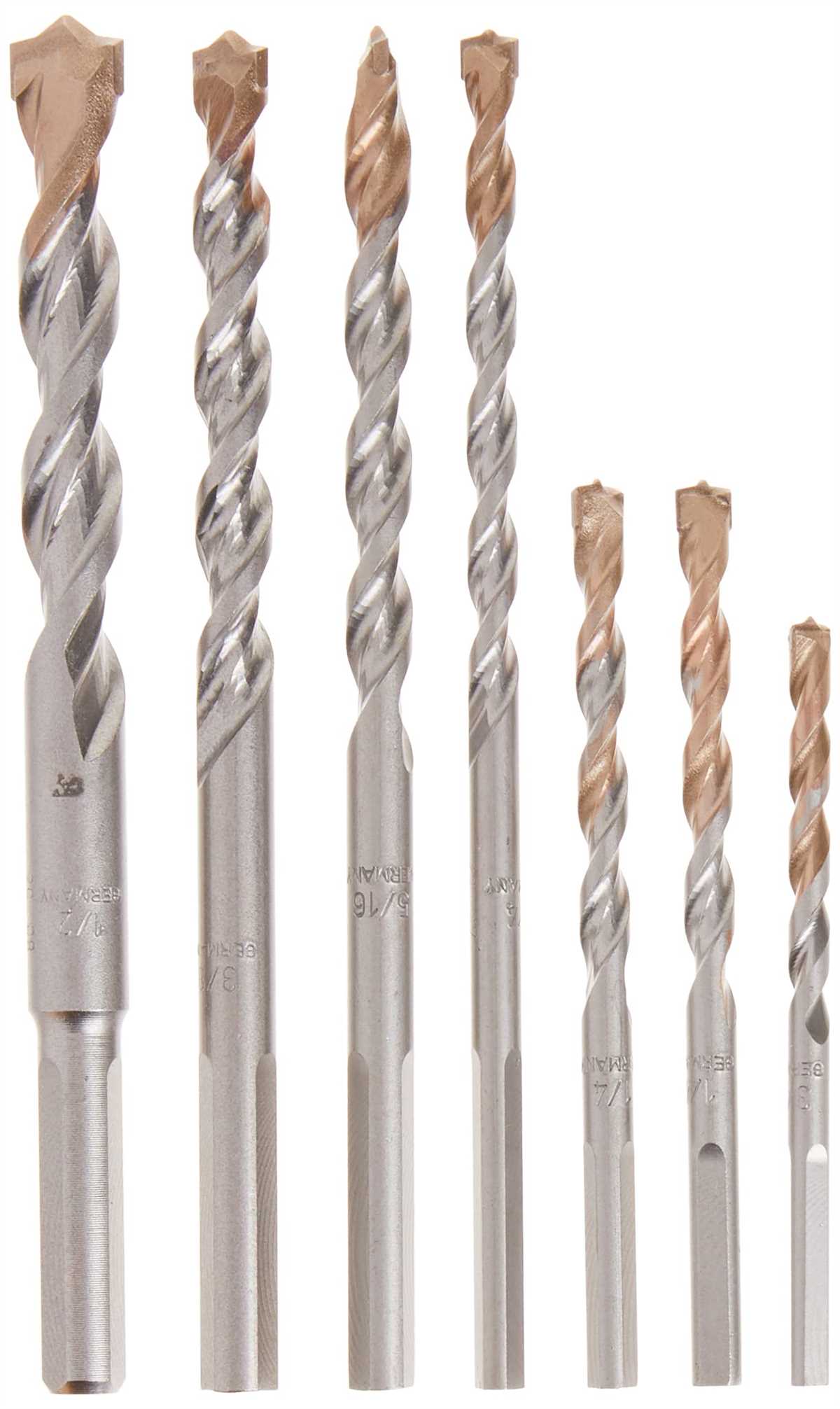
The shank type of the drill bit is another factor to consider. Most masonry drill bits have a straight shank, which can be used with a regular drill. However, if you’re using a hammer drill or rotary hammer, you may need a drill bit with an SDS (Slotted Drive System) shank.
5. Price and Quality
Consider the price and quality of the masonry drill bit. While it may be tempting to go for cheaper options, investing in a high-quality drill bit can save you time and effort in the long run. Look for reputable brands and read reviews to ensure you’re getting a durable and reliable product.
Remember, using the right masonry drill bit is crucial for the success of your project. Take the time to consider these factors and choose a drill bit that suits your needs. With the right drill bit, you’ll be able to drill into masonry materials with ease and precision.
Common Uses for Masonry Drill Bits
Masonry drill bits are designed specifically for drilling into masonry materials such as concrete, brick, or stone. They have a unique design and construction that allows them to effectively penetrate and create holes in these tough materials.
1. Installing Anchors
Masonry drill bits are commonly used for installing anchors in masonry walls. Whether you’re hanging shelves, mirrors, or heavy artwork, using masonry drill bits will ensure that your anchors are securely fastened to the wall.
2. Creating Holes for Pipes and Wires
When installing plumbing or electrical systems in masonry walls, masonry drill bits are indispensable. They allow you to create precise holes to pass pipes, wires, or cables through the walls without damaging the surrounding material.
3. Home Improvement Projects
Masonry drill bits are a must-have tool for various home improvement projects. From building outdoor structures like patios, decks, or retaining walls to creating pot holes for planting trees or installing outdoor lighting, masonry drill bits are essential for working with masonry materials.
4. Construction and Renovation
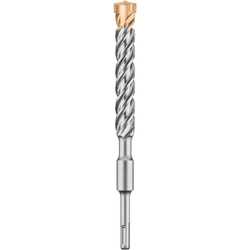
In the construction industry, masonry drill bits are regularly used for various tasks. Whether it’s drilling holes for structural purposes, creating openings for windows or doors, or installing fixtures and fittings in masonry walls, these drill bits are an integral part of the construction process.
5. DIY Crafts and Decorative Projects
Masonry drill bits can also be used for DIY crafts and decorative projects. Whether you’re making concrete planters, creating a stone mosaic, or working on other creative projects, masonry drill bits allow you to shape and manipulate masonry materials with ease.
6. Masonry Repair
If you need to repair cracks or damaged masonry, masonry drill bits are essential tools. They allow you to create clean holes for injecting epoxy or other repair materials into the damaged areas, ensuring a durable and long-lasting repair.
7. Professional Masonry Work
Professional masons rely heavily on masonry drill bits for their everyday work. Whether it’s for bricklaying, stone carving, or other specialized masonry tasks, having the right set of masonry drill bits is crucial for achieving professional results.
In conclusion, masonry drill bits are versatile tools with a wide range of applications. Whether you’re a DIY enthusiast or a professional mason, having a set of masonry drill bits in your toolbox will allow you to tackle various projects and tasks involving masonry materials.
How to Properly Use a Masonry Drill Bit
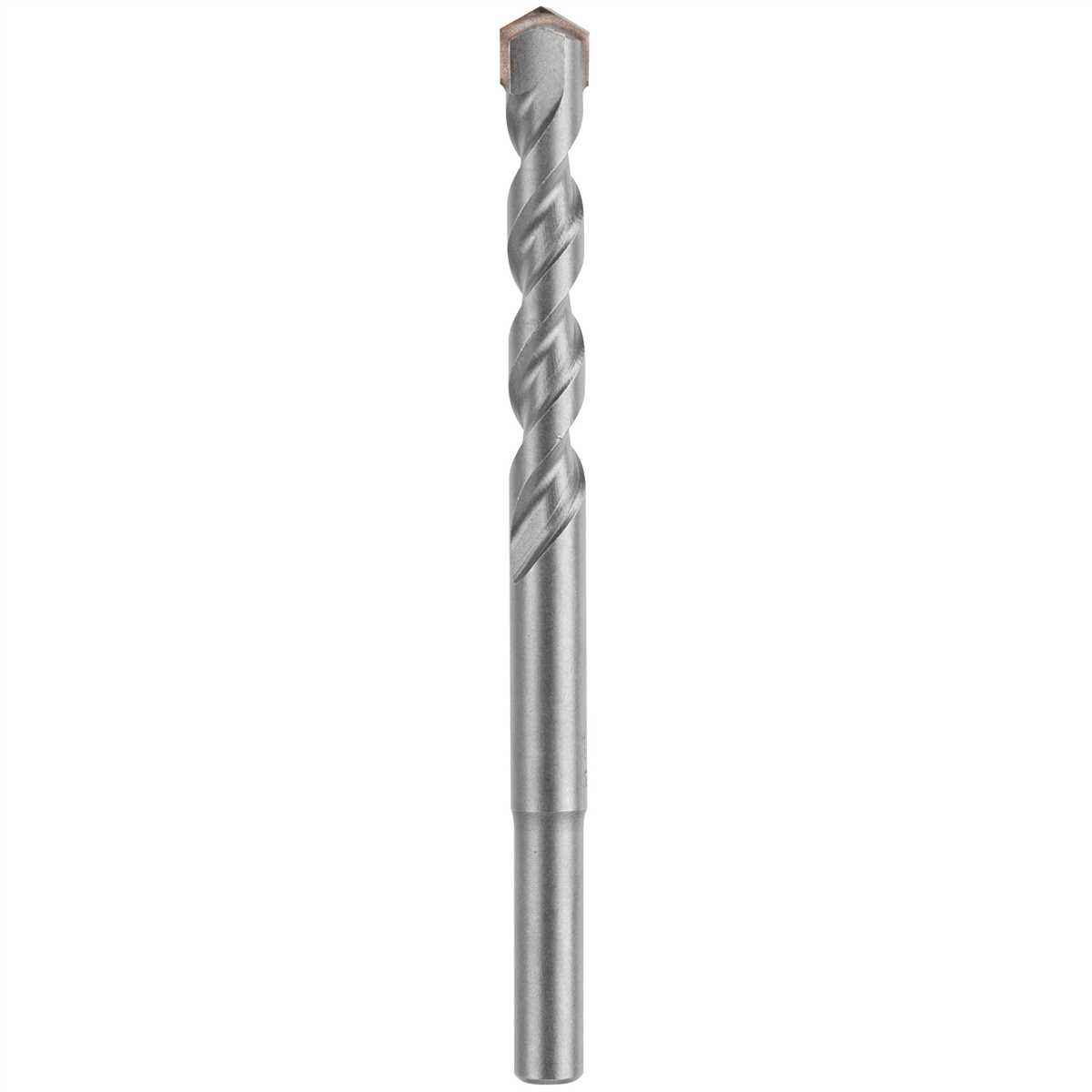
1. Selecting the Right Drill Bit Size
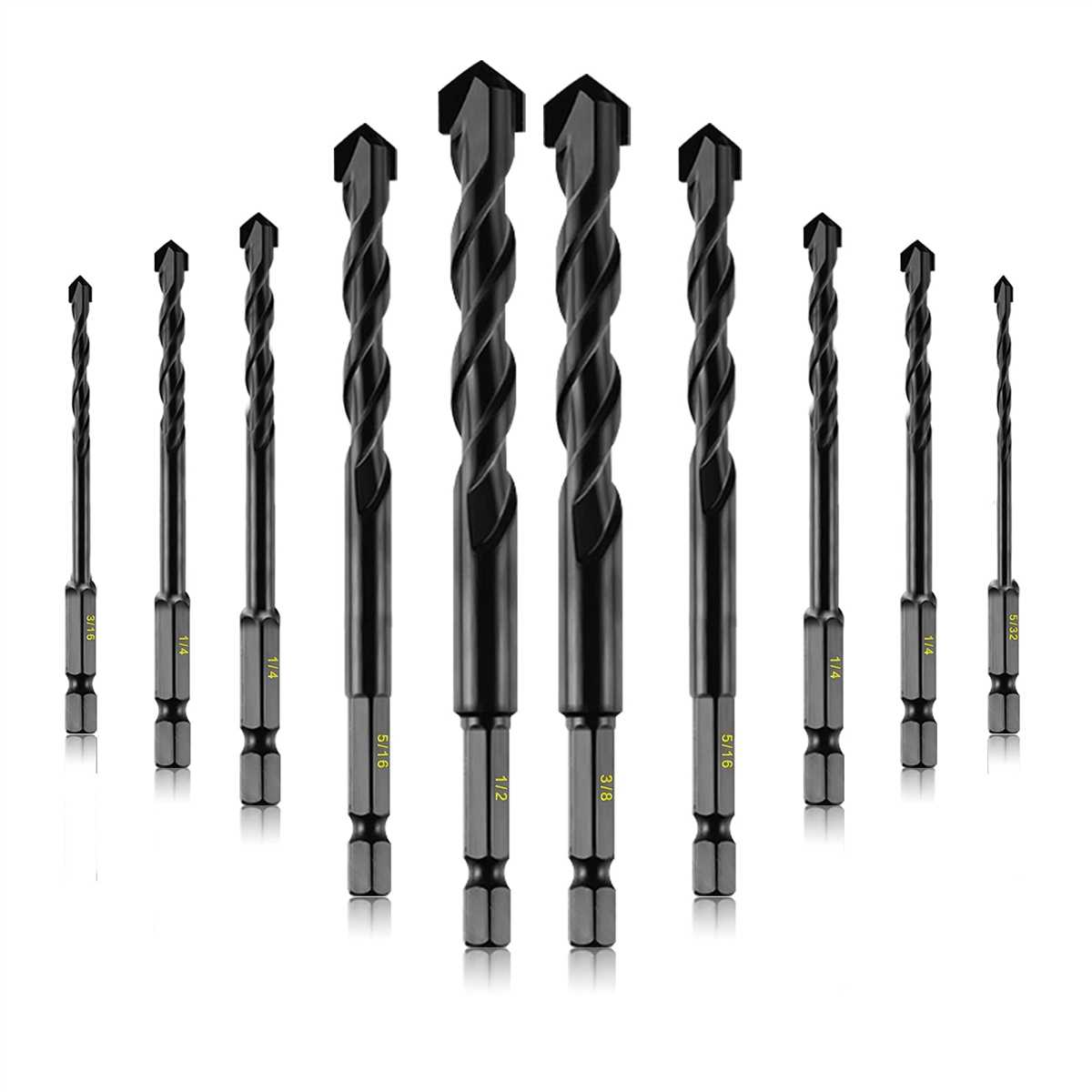
Before using a masonry drill bit, it’s important to choose the right size for your project. Masonry drill bits come in various sizes, typically indicated by their diameter in inches or millimeters. The size you choose will depend on the specific task at hand, such as the diameter of the hole you need to drill.
2. Choosing the Right Drill Bit Type
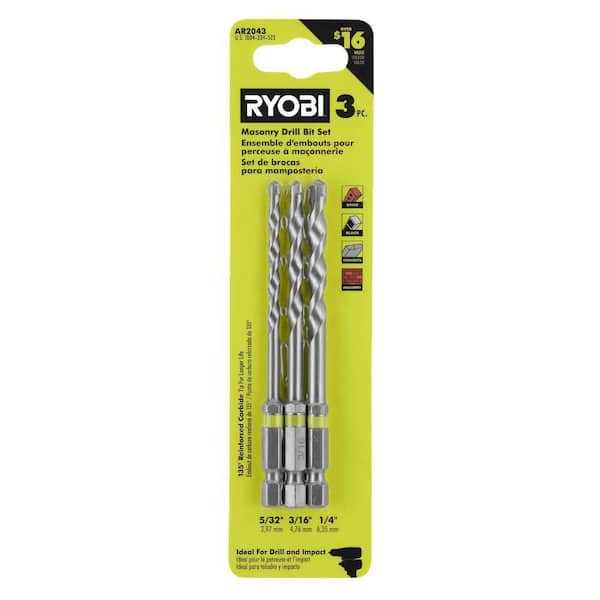
There are different types of masonry drill bits available, each designed for specific materials and applications. Common types include carbide-tipped, diamond-tipped, and percussion drill bits. Carbide-tipped drill bits are versatile and suitable for most masonry materials, while diamond-tipped bits are ideal for hard surfaces like concrete. Percussion drill bits are designed for use with a hammer drill, providing additional impact force.
3. Preparing the Work Area
Before you start drilling, it’s important to prepare the work area. Ensure that the surface is clean and free from any debris or loose materials. If necessary, mark the drilling location with a pencil or marker to guide your drilling.
4. Wearing Safety Gear
Safety should always be a priority when using a masonry drill bit. Wear protective gear such as safety goggles to protect your eyes from flying debris, and gloves to protect your hands. Additionally, consider wearing a dust mask to prevent inhalation of any dust or particles.
5. Using Proper Technique
To properly use a masonry drill bit, follow these steps:
- Insert the chosen masonry drill bit into the chuck of a drill.
- Secure the drill bit by tightening the chuck.
- If using a hammer drill, set it to the appropriate mode (hammer, drill, or both).
- Position the drill bit perpendicular to the surface you’re drilling into.
- Apply firm and steady pressure to the drill, while keeping it aligned with your drilling location.
- Start the drill at a slow speed and gradually increase the speed as the bit begins to penetrate the material.
- Continue drilling until you’ve reached the desired depth, periodically withdrawing the drill bit to remove any accumulated dust.
6. Taking Breaks
Drilling into masonry materials can be physically demanding. To prevent overheating of the drill bit or the drill motor, it’s important to take breaks during extended drilling sessions. This will allow the equipment to cool down and prevent any potential damage.
7. Cleaning Up
After you’ve finished using the masonry drill bit, remove it from the drill chuck and clean it. Brush off any remaining dust or debris, and store the drill bit in a dry and secure location to prevent damage or corrosion.
By following these steps, you can ensure that you’re properly using a masonry drill bit and achieve accurate and efficient results for your masonry projects.
Tips for Maintaining and Extending the Lifespan of Masonry Drill Bits
1. Use the Correct Bit for the Material
Using the correct masonry drill bit is essential for maintaining its lifespan. Different drill bits are designed for specific materials such as brick, concrete, or stone. Make sure to choose the appropriate bit for the material you are drilling into.
2. Keep the Bit Cool
Drilling into masonry can generate a lot of heat, which can damage the drill bit. To prevent overheating, it is important to keep the bit cool. You can do this by periodically pulling the bit out of the hole and allowing it to cool down or use a coolant spray designed for masonry drilling.
3. Use Proper Technique
Using the right technique when drilling into masonry can help prolong the lifespan of the drill bit. Apply steady pressure and avoid excessive force or pushing. Let the drill bit do the work and avoid putting too much strain on it.
4. Clean the Bit Regularly
Masonry drilling can create debris and dust that can accumulate on the drill bit. To keep the bit in good condition, clean it regularly. Use a brush or a cloth to remove any dirt or debris after each use. This will help prevent build-up and maintain the sharpness of the drill bit.
5. Store Properly
Proper storage is essential for maintaining the lifespan of masonry drill bits. After use, clean the drill bit and make sure it is completely dry. Store it in a dry and secure place where it will not be subjected to any unnecessary pressure or damage.
6. Inspect for Damage
Regularly inspect the drill bit for any signs of damage or wear. Look for cracks, chips, or dullness. If you notice any damage, it is important to replace the drill bit to prevent further issues and ensure safe and effective drilling.
7. Use a Suitable Drilling Speed
The speed at which you drill into masonry can greatly affect the lifespan of the drill bit. Using a high speed can cause excessive heat and wear, while drilling too slowly can result in poor performance. Find the optimal drilling speed for the material you are working with to maximize the lifespan of the drill bit.
8. Avoid Excessive Torque
Excessive torque can put stress on the drill bit and shorten its lifespan. To avoid this, use a drill with adjustable torque settings and adjust it according to the specific requirements of the material you are drilling into.
9. Replace When Necessary
Even with proper maintenance, drill bits will eventually wear out. It is important to monitor the performance of the bit and replace it when it starts to show signs of wear or becomes less effective. Using a worn-out drill bit can lead to poor results and potential safety hazards.
By following these tips, you can extend the lifespan of your masonry drill bits and ensure efficient and safe drilling into masonry materials.
Where to Buy Masonry Drill Bits and How Much They Cost
If you’re in need of masonry drill bits, there are several places you can purchase them. Here are some of the options:
1. Local Hardware Stores
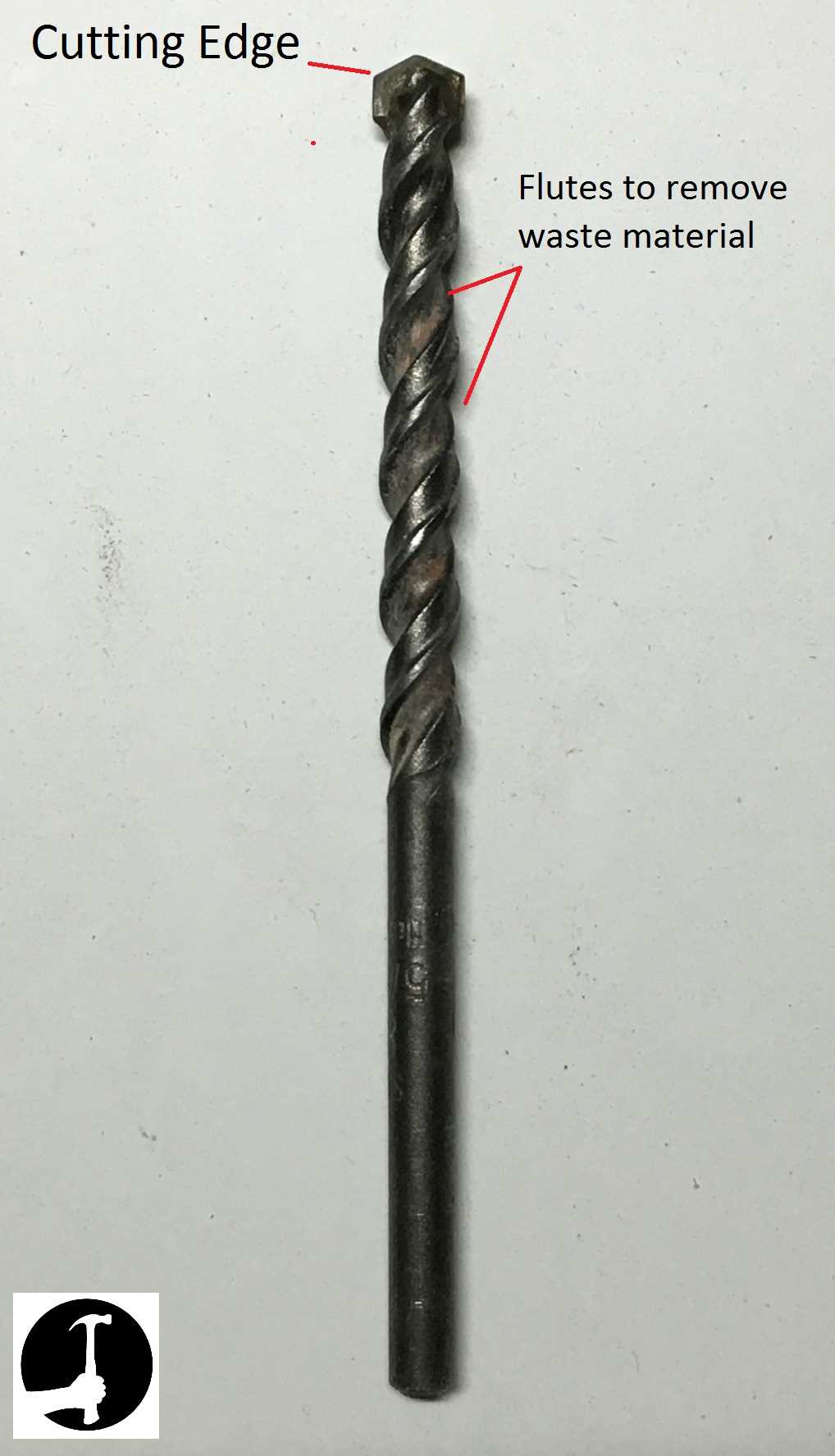
One of the easiest ways to purchase masonry drill bits is by visiting your local hardware store. Most hardware stores carry a variety of drill bits, including masonry drill bits. You can typically find them in the tool section or in a dedicated drill bit aisle. Prices will vary depending on the brand and quality, but expect to pay around $5 to $15 per drill bit.
2. Home Improvement Centers
Home improvement centers, such as Home Depot or Lowe’s, are also good places to buy masonry drill bits. These stores usually have a larger selection compared to local hardware stores. You can find drill bits from different brands and sizes. The prices may be slightly higher compared to hardware stores, ranging from $8 to $20 per drill bit.
3. Online Retailers
If you prefer the convenience of online shopping, you can find a wide variety of masonry drill bits on websites like Amazon, eBay, and specialized tool retailers. Online retailers often have detailed descriptions, customer reviews, and sometimes offer discounts or free shipping. Prices can vary significantly depending on the brand, quality, and seller, but expect to pay anywhere from $5 to $30 per drill bit.
4. Industrial Supply Stores
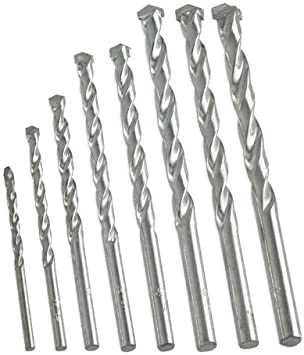
If you’re looking for high-quality masonry drill bits or need them in bulk quantities, industrial supply stores may be your best option. These stores cater to professionals and offer a wider range of drill bits. Although prices can be higher compared to other options, the quality and durability are usually better. Prices for masonry drill bits at industrial supply stores can range from $10 to $50 or more per drill bit.
5. Online Marketplaces
Lastly, you can also consider checking online marketplaces like Alibaba or Global Sources if you’re looking for drill bits in bulk or want to explore international options. These marketplaces connect you with manufacturers and suppliers from around the world and can offer competitive prices. However, keep in mind that shipping costs and delivery times may vary.
As always, it’s essential to compare prices, read customer reviews, and consider the quality and durability of the drill bits before making a purchase. Also, keep in mind that while cheaper options may save you money upfront, they may not last as long or perform as well as higher-quality drill bits.
FAQ:
What is a masonry drill bit?
A masonry drill bit is a type of drill bit specifically designed for drilling into materials such as brick, concrete, stone, or ceramic tiles.
What does a masonry drill bit look like?
A masonry drill bit typically has a hardened carbide tip for increased durability and a twisted shank. It may also have flutes or grooves along the body of the bit to help remove debris from the hole as it is being drilled.
Can I use a regular drill bit on masonry materials?
No, regular drill bits are not suitable for drilling into masonry materials. They are often made of softer materials that cannot withstand the high levels of force and friction that are involved in drilling into materials like brick or concrete. Using a regular drill bit on masonry materials can result in damage to the bit and the drill, and may also lead to poor drilling performance.
Are masonry drill bits expensive?
The cost of masonry drill bits can vary depending on factors such as the size and quality of the bit. Generally, masonry drill bits are priced higher than regular drill bits due to their specialized design and materials. However, they are still relatively affordable and can be a worthwhile investment if you frequently need to drill into masonry materials.
How do I choose the right masonry drill bit?
When choosing a masonry drill bit, consider the type and hardness of the material you will be drilling into. Some masonry drill bits are specifically designed for certain materials, such as brick or concrete. Additionally, consider the size of the hole you need to drill and choose a bit that matches those specifications. It is also important to choose a high-quality bit that is made from durable materials to ensure longevity and optimal drilling performance.
Can I use a masonry drill bit on other materials?
While masonry drill bits are specifically designed for drilling into masonry materials, they can also be used on other materials such as wood or plastic. However, it is important to note that the performance of the bit may not be as effective on these materials compared to using a dedicated bit designed for that specific material.
Video:











